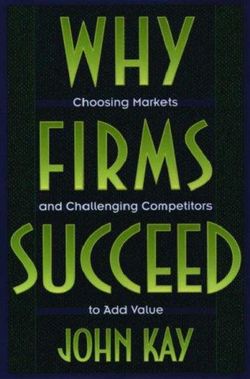Britain, bar none.... He is a rare find." Now John Kay has produced an American edition of this landmark book. In this freshly revised volume, Kay applies his groundbreaking theories to the U.S. experience, illustrating them with
examples of success and failure in the American market. For too long, he writes, managers have chased after the latest fad in business planning and strategy, beguiled by military analogies and the demand for overarching vision. Success, he believes, should not be measured by organizational size or market share, but by the added value--the amount that output exceeds the input of raw materials, payroll, and capital. Corporate strategy should be aimed at this basic goal, beginning with the
question, "How can we be different?" Kay identifies four key ingredients: innovation, reputation (especially in the form of brands), strategic assets (government mandated monopolies or other measures which
restrict market access by competitors), and architecture (the relationships between a company and its employees, suppliers, and customers). Success comes not when managers drive through a towering vision of the company's destiny, but when they act on their organization's specific capabilities and advantages--especially in the key area of architecture. Honda, he notes, captured a third of the American motorcycle market within five years. No vision was required for this success, he writes: Honda
simply did what it did best (making a simple, inexpensive product), followed by careful attention to the architecture of its business ties to distributors, customers, etc. He ranges through industries
from airlines to retail clothing, pointing out the reasons for successes and failures. Kay also draws on game theory to underscore the importance of stable, long-term relationships. Other writers have hit upon some of these points, the Financial Times noted: "But none has explored them as thoroughly as Kay, who succeeds in marrying an authoritative grasp of economic, legal, and sociological theory with an impressively detailed knowledge of contemporary business
practice." This volume transforms Kay's theoretical and practical knowledge into a powerful tool for today's American business manager.




Share This Book: